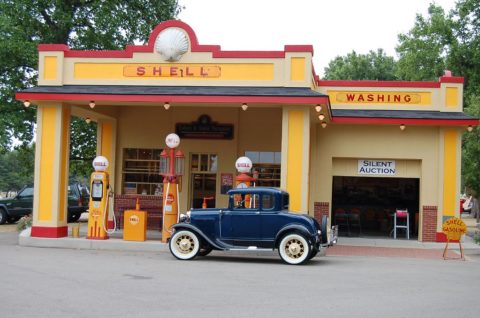Of course, by “noble reasons” I mean “corrupt crony capitalist reasons“:

“Model A Ford in front of Gilmore’s historic Shell gas station” by Corvair Owner is licensed under CC BY-SA 2.0
New Jersey’s law, like Oregon’s, ostensibly stemmed from safety concerns. In 1949, the state passed the Retail Gasoline Dispensing Safety Act and Regulations, a law that was updated in 2016, which cited “fire hazards directly associated with dispensing fuel” as justification for its ban.
If the idea that Americans and filling stations would be bursting into flames without state officials protecting us from pumping gas sounds silly to you, it should. In fact, safety was not the actual reason for New Jersey’s ban (any more than Oregon’s ban was, though the state cited “increased risk of crime and the increased risk of personal injury resulting from slipping on slick surfaces” as justification).
To understand the actual reason states banned filling stations, look to the life of Irving Reingold (1921-2017), a maverick entrepreneur and workaholic who liked to fly his collection of vintage World War II planes in his spare time. Reingold created a gasoline crisis in the Garden State, in the words of New Jersey writer Paul Mulshine, “by doing something gas station owners hated: He lowered prices”.
In the late 1940s, gasoline was selling for about 22 cents a gallon in New Jersey. Reingold figured out a way to undercut the local gasoline station owners who had entered into a “gentlemen’s agreement” to maintain the current price. He’d allow customers to pump gas themselves.
“Reingold decided to offer the consumer a choice by opening up a 24-pump gas station on Route 17 in Hackensack,” writes Mulshine. “He offered gas at 18.9 cents a gallon. The only requirement was that drivers pump it themselves. They didn’t mind. They lined up for blocks.”
Consumers loved this bit of creative destruction introduced by Reingold. His competition was less thrilled. They decided to stop him — by shooting up his gas station. Reingold responded by installing bulletproof glass.
“So the retailers looked for a softer target — the Statehouse,” Mulshine writes. “The Gasoline Retailers Association prevailed upon its pals in the Legislature to push through a bill banning self-serve gas. The pretext was safety …”
The true purpose of New Jersey’s law had nothing to do with safety or “the common good”. It was old-fashioned cronyism, protectionism via the age-old bootleggers and Baptists grift.
Politicians helped the Gasoline Retailers Association drive Reingold out of business. He and consumers are the losers of the story, yet it remains a wonderful case study in public choice theory economics.
The economist James M. Buchanan received a Nobel Prize for his pioneering work that demonstrated a simple idea: Public officials tend to arrive at decisions based on self-interest and incentives, just like everyone else.



